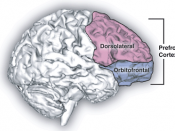AbstractThis paper discusses the relationship between emotion and cognition. It is probably non-productive to attempt to separate emotion from cognition. Emphasis is laid on the interdependence between cognition and emotion in ways that challenge the simple division of labor into separate emotional and cognitive domains. In the context of psychology and the mind, general dichotomization alluded to emotion and cognition in terms of subcortical-emotional and cortical-cognitive areas of the brain is especially now seen as simplified, thus breaking down quite fast when a deeper analysis or research is carried out.
IntroductionCognition refers to processes like attention, memory, planning, problem solving and language. Thus many a time, cognitive processes can involve sophisticated functions which may be unique to primates. Cognitive processes usually involve so-called controlled processes, such as when pursuing a certain goal (like the maintaining of a piece of information in the brain) must be protected from interferences like distracting stimuli.
"A prototypical example of a neural correlate of a cognitive process is the sustained firing of cells in dorso-lateral prefrontal cortex as a monkey maintains information in mind for brief periods of time" (Fuster and Alexander, 1971; Kubota and Niki, 1971). It seems that cognitive processes actually do engage cortical sections of the mind with MRI function. This study aims to study the relationship between cognition and emotion and to investigate the integration of emotion in cognitionAlthough is seems that there is relative agreement about what constitutes cognition, this is not the case with what constitutes emotion. Some research has been carried out on the definitions that incorporate the concepts of motivation and drive. Some see emotions as states elicited by punishment and reward, while others feel that emotions are part of the conscious or sub-conscious appraisal of events. Emotions are also evidently linked to the body and...


